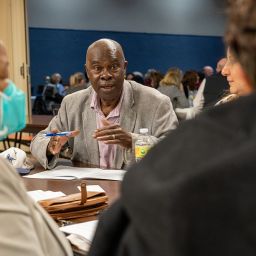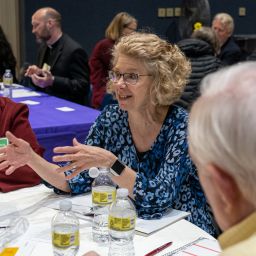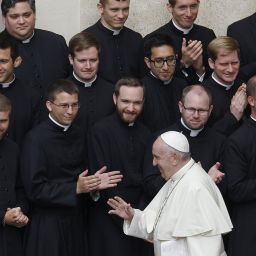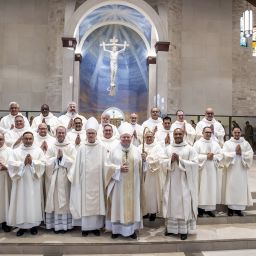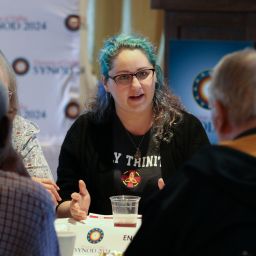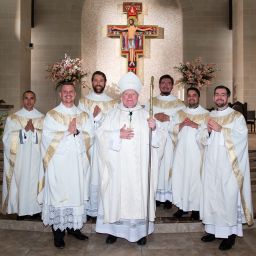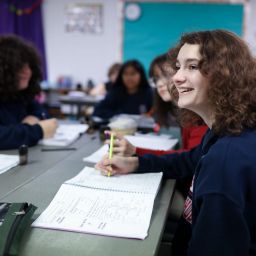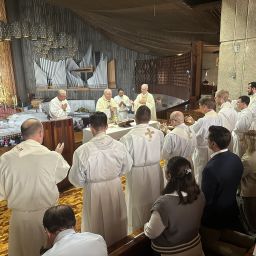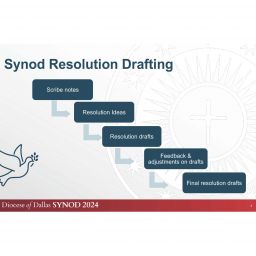
By Michael Gresham
The Texas Catholic
RICHARDSON — The future of the church in north Texas starts at home, Bishop Edward J. Burns told a room full of participants gathered for a Diocese of Dallas Synod listening session on “Vocations and Ministerial Formation” in the St. Paul the Apostle Catholic Church parish hall on Jan. 28.
“It all starts at the domestic church — and that is in the home,” Bishop Burns said. “It is at home that we need to pray for priests, pray for women religious, pray for deacons, and pray for men religious. It creates within the home a real support for church vocations. Ultimately, we must also do this on a parish and diocesan level, but by doing that at home, we create a vocations culture.”
The bishop said that vocations culture must grow from the nuclear family, moving into the parish family and then beyond.
“There should be prayers for the faithful,” Bishop Burns said. “There should be an openness to discussion. There should be opportunities for young men and young women to consider church vocations. There should be opportunities for vocations to lay ministry. All of this is so vital for the church.”
The gathering at St. Paul the Apostle was the 12th in a series of listening sessions aimed at creating dialogue and gathering information for the 2024 Diocese of Dallas Synod, called by Bishop Burns in February 2021 as a response to the historic COVID-19 pandemic.
“I wanted to do something in this diocese that would help build up the church, that would help strengthen us, that would give us the opportunity to serve in a better way, and that would really excite the faithful about the gift of the church in north Texas,” explained Bishop Burns, adding that for the synod to be impactful, the voices of the faithful need to be heard. “All of you help in the work of this diocese. All of you are so very vital and important in this synodal process.”
Bishop Burns praised people’s involvement in the listening sessions, noting the importance of their participation and urging the faithful to continue to be involved in future sessions.
“I find the conversations to be rich at the tables. It is a joy to be in dialogue about the elements that matter most in our church,” Bishop Burns said. “I cherish the fact that people say, ‘Oh, we need more time.’ There is so much more to say because in this diocese there is so much more to do. With your help, we’re going to see what we need to do. There’s going to be a rallying call for everyone to help.”
On Jan. 28 in Richardson, that rallying call focused on vocations, a topic near-and-dear to Bishop Burns, who prior to becoming a bishop served as both a vocations director and director of the Department of Clergy and Ministerial Formation for the Diocese of Pittsburgh as well as the executive director of the Secretariat for Vocations and Priestly Formation at the United States Conference of Catholic Bishops.
“It is all about creating that vocations culture, where young men and young women feel supported in stepping forward to answer that call to vocations,” Bishop Burns said.
Father Paul Bechter, who serves as the diocesan director of vocations, said the diocese strives to provide that support to people interested in discerning vocations.
“It is about trusting in God, that He is going to lead us where He wants us to go,” Father Bechter said.
Learn more about Diocese of Dallas vocation formation efforts at www.dallasvocations.org. Learn more about the Diocese of Dallas Synod by visiting www.cathdal.org/synod.

